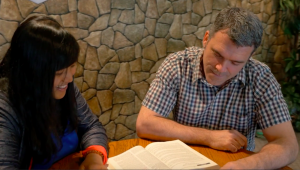Dustin Laird is the planting pastor of Redemption Community Church in Surrey, BC, Canada. He was among the second graduating class of Northwest Baptist’s CBTE-based degree Immerse in 2017.
CBTE News: Why did you enroll in the Immerse program?
The Immerse program came along at just the right time to guide me through what would be a number of years of learning and development. The church planting journey was not one I expected to be on. I was sure the Lord had called me to it but I was up to my neck in it. Immerse was crucial to my ability to carry-on in the role that I have.
The opportunity to be in the midst of ministry at the same time as learning the theological and skillful aspects of ministry was invaluable. I had considered staying at Bible College and carrying on from my bachelors into a masters. But, as I had some classes that overlapped with students in the masters programs, I realized that what they brought to the classroom was an entirely different perspective. They had real-life ministry experience and were able to think critically about the material and how it interacted with what they had actually experienced in ministry. As someone who had no ministry experience, I thought I could just take in the academic information and quickly get it done. I learned I needed experience to push back against the material and think critically about it.
CBTE News: What did you receive from Immerse that you would not have gotten in a conventional seminary program?
Maturity. As someone lacking experience in pastoral ministry, I thought I had a bag of tricks that I could use for a while to endear the people to me. But as I began to serve in ministry, I wanted more than to endear the people to me. I wanted to lead God’s people. I wanted to care for them well, to be theologically responsible in my opportunity to lead them. I realized quite quickly that I would come to the end of myself and need to rely on the Lord, having an ongoing posture of learning. I recognized that with all my shortcomings and faults, the Lord had called me to this task and that I was sufficient for the task as long as He was the One who was leading me step by step. Without Immerse, I don’t think I would have been able to sustain a proper attitude and a real usefulness in ministry – even this beginning stage of ministry. I would have been far too self-reliant and I would have run out of what I had to offer the people.
CBTE News: One of the core elements of Immerse (and many other CBTE programs) is training under the guidance of a mentor team. What was that experience like for you?
Incredible! I had a team of mentors around me that I knew would take my calls and have wisdom to offer. I wasn’t cycling in and out of the lives of professors who didn’t know me particularly well. Instead, I was able to go to leaders who had not only earned my trust and respect but personally knew me. They knew both my strengths and my weaknesses and were able to guide me in light of those things. In one instance we faced difficulties in the life of the church that needed to be tackled head-on. My mentors knew that approach wouldn’t be my tendency and were able to guide me through this situation because they knew me very personally.
CBTE News: What have been some of the lasting effects of the program that have stayed with you even after graduation?
I didn’t have much of an interest in learning prior to the Immerse program. I had done my first degree and was quite content to see where that would take me. But throughout the program, I fell in love with learning. I learned how to direct my own self-development. Even just a few weeks after graduation I made a plan of where I wanted to continue to grow and how I was going to engage with that. I wrote up a plan and gave it to some of my leadership team to help me. The desire for continued growth is definitely a lasting effect.
The program and my involvement in it has been invaluable for me personally and spiritually; for my character growth, for my confidence in ministry, for my sense of calling, for my competency in being able to do what I do, for me as a man of God leading my family. I attribute so much of my growth over the last few years to the program and those who surrounded me in it. I truly think that my longevity in ministry and my sustainability in it is in large part due to what this program has given me as a foundation.
 Paul Olson is the Pastor of Burnett Fellowship Baptist Church in Maple Ridge, British Columbia. He served as the ministry mentor for Glory Destura, one of the first students in Northwest Baptist’s CBTE program, Immerse.
Paul Olson is the Pastor of Burnett Fellowship Baptist Church in Maple Ridge, British Columbia. He served as the ministry mentor for Glory Destura, one of the first students in Northwest Baptist’s CBTE program, Immerse.